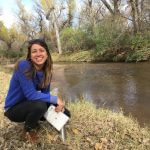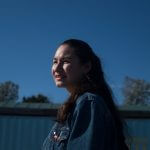Joanne Douglas
Philadelphia, Pennsylvania
Joanne Douglas is an environmental artist and educator currently living and working in Philadelphia, Pennsylvania. Her work as the Watershed Interpretation Manager at Bartram’s Garden, a co-founding member of (Encouraging Development of a Green Economy) and work with Kosmologym, an arts and game design collective, all intersect with her artistic practice. Through mixed-media visuals and creative writing she investigates the complicated connections and relationships between humans, water, industry and influences on perceptions and definitions of space. Joanne holds a Bachelor of Arts in Political Science from the University of Pennsylvania and is working on a Master of Environmental Studies, also at the University of Pennsylvania.
This interview was conducted by Carly Schmidt on June 10, 2020. Learn more about Joanne’s work at Bartram’s Garden.
Tell me a bit about your role at Bartram’s Garden.
At Bartram’s, I started the high school river internship, which is a 6-week summer program that runs from July to mid-August. I also run the youth river program, which is broken into three parts. We have the high school internship in the summer, we have boat-building with middle-schoolers during the school year, and then we have a fall/winter advocacy program that we run with a group called E.D.G.E. (Encouraging Development of a Green Economy). That last program is advocacy training and basically allowing high schoolers who want to stay involved during the school year to stay engaged and go a little bit deeper into what they encounter in the 6-week summer internship. I am also building a watershed curriculum for the Garden. The curriculum is for all ages, even adults, and focuses on how to interpret the watershed and talk about the river to other departments.
Why provide a paid internship program for high school students?
The reason that I started the program was, as an African-American woman, I noticed that there is a lack of representation of people of color in the environmental field. A lot of students in Philadelphia don’t realize that this is a viable career path for them. The jobs are not the highest paying – they’re not like doctor, lawyer, or engineer – and my drive was to get these young people involved and exposed to some of these careers in this field. The way to do this is through the water program. Many of the students we work with live along the river in Philadelphia and are from communities that will be impacted by climate change immediately. They are also, of course, younger and not able to vote or get as engaged politically in ways that adults can. The youth can now get involved by working with Chloe Wang (River Programs Coordinator at Bartram’s Garden) to do water testing, better understanding the health of the river and share what they learn with the public in a creative way. The letter to Pennsylvania Department of Environmental Protection (DEP) allowed them to get civically engaged at a time when they can’t vote.
When did you start writing this letter from Bartram’s Garden to the Pennsylvania Department of Environmental Protection and what was the process like?
We started in October of 2019. We began the process by compiling all the data we collected over the summer, which was done by students and volunteers. Around August, we started this process of trying to learn and decipher as much as we could from the data, which ultimately led us to realize that we needed more data! We spoke with Alice Baker (formerly of PennFuture) and Gayle Killam (formerly of River Network), who had provided the ins and outs of how to write an effective letter to policymakers. We would not have known any of that information without this partnership. The collaboration was so important because they know policy and what agencies to go to in order to make change, which would have taken hours to figure out on our own. We were able to get to the letter writing quickly because of them. Chloe managed the volunteer writing process and I worked with the students over two or three workshops to write our portion. Then we synthesized everything and sent it over to DEP.
What came out of the youth writing workshops?
The students chose to do the introduction and talk about the youth program and make the asks. It was a funny time! One student suggested that we start the letter with a compliment because that’s what he does when he asks his dad for money. We thought it was a great idea, so we thanked DEP for what they have done well before we got into what can be improved. They really did lead the tone of the letter and were able to infuse it with their ‘why.’ Really being able to step back and let them write was wonderful because they put so much work into it.
How are the students building on their experience with writing this letter?
We are going into our fourth season with this program and, for a lot of our students, it is their second or third season with the program. Last summer was the first time the students have written a letter to understand why this work is important and the impact they can have. The reason we started the advocacy training program was because we thought that the students would lose a lot of their knowledge and engagement over the school year. Now, there’s a lot of checking in throughout the year. This coming season, the students are going to do a podcast about these issues and they have control over how their work progresses.
What were some of the challenges in getting this program off the ground?
Not running a boating program before! I had to learn all about boating with youth. I also had to learn how to build boats. The learning curve was definitely a challenge, but I am always excited by a new challenge. Another challenge is that a lot of the recreation programming is not culturally relevant to our students, so I had to mitigate that. I remember trying to identify what African-American aquatic culture is and what the roots are. We also have a large population of South East Asian people around South Philadelphia, so I am slowly trying to build those relationships and make the program relevant for them. For example, not every culture fishes with a pole, and a sailboat or a skiff are not the only boats out there. I am trying to include different types of watercraft and incorporate learning about different religious ceremonies and spiritual traditions around water to make the program as inclusive as possible.
How have you adapted your programmatic curriculum to be inclusive to all youth in Philadelphia?
First, I look at who is around me and who is showing up. Then I research historical practices around water and build curriculum through that lens, rather than a white-dominant lens about how people engage with nature. It’s a lot of deep research and including that research into lesson plans. In our boat-building program, we understand how to build a boat but we’re considering how to change the design or incorporate different design ideas that are reflective of other cultures. I know that this kind of inclusion is effective because it is so meaningful to have people who look like our students to talk about their work in the environmental field. We are creating curriculum and watercraft that the students can see themselves reflected in.
How would you like to see these programs grow and develop over time?
I would like to see returning students who eventually go off on their own and still engage civically. So many people have gotten on the water because of this program and I am so proud of that. I would like to continue to see people who have not always had access to the river be able to use it in ways that are meaningful for them. I would also love to see more access, period! It’s so industrial where we are and people are just cut off from the river. We can make fishing and boating a bit safer for people. I think we could have a big hand in that if we continue to grow the program.








